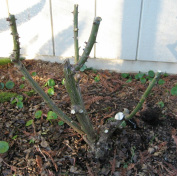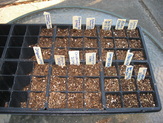January Gardening Tips

In most of the country, there's not too much to do during the winter months for your garden except flip through catalogs and dream about the coming warmer months.
In Northern California, and in fact most of the west coast where we don't get a deep freeze or snow, the winter months are the perfect time to start pruning fruit trees and rose bushes! These plants are dormant at this time of year, so it's the ideal time to cut back last year's growth in order to encourage healthy new growth come spring time.
There's lots of information on the web on how to prune these plants, so do a little bit of research or take a class to learn the proper pruning techniques required. Master Gardeners offer free classes this time of year on pruning roses and fruit trees as part of our outreach program. To find a Master Gardener near you, search "Master Gardener" and the county you live in.
In Northern California, and in fact most of the west coast where we don't get a deep freeze or snow, the winter months are the perfect time to start pruning fruit trees and rose bushes! These plants are dormant at this time of year, so it's the ideal time to cut back last year's growth in order to encourage healthy new growth come spring time.
There's lots of information on the web on how to prune these plants, so do a little bit of research or take a class to learn the proper pruning techniques required. Master Gardeners offer free classes this time of year on pruning roses and fruit trees as part of our outreach program. To find a Master Gardener near you, search "Master Gardener" and the county you live in.
February Gardening Tips

If you haven't started pruning your roses and fruit trees yet, there is still time. You want to make sure and get this done before the plants start "waking up" from their winter dormancy and putting out new leaves! It's not too late if the plants have started to leaf out, but don't wait!! Get your pruning done right now before the plants fully start moving into their active growing phase!
With the weather starting to warm up, and longer periods of daylight, I know you want to get out and get your hands in the soil. February is the perfect time to start vegetable seeds indoors. Make sure you read the directions on the seed packets though! Some plants, like cucumber, zucchini and melons don't do well started indoors– they prefer to be seeded directly into the ground. But for those plants that do well starting indoors, such as tomatoes and peppers, this is the perfect time. Get a tray with small cells and fill it with a potting mix especially designed to start seeds in (this will have mostly peat moss, compost and vermiculite) and follow the directions on the seed packet. Make sure to label your plants! Its easy to mix them up when they're this small. Seeds generally germinate within a week. This will give them a full month or two to grow strong before it's warm enough to plant them in the garden outside!
With the weather starting to warm up, and longer periods of daylight, I know you want to get out and get your hands in the soil. February is the perfect time to start vegetable seeds indoors. Make sure you read the directions on the seed packets though! Some plants, like cucumber, zucchini and melons don't do well started indoors– they prefer to be seeded directly into the ground. But for those plants that do well starting indoors, such as tomatoes and peppers, this is the perfect time. Get a tray with small cells and fill it with a potting mix especially designed to start seeds in (this will have mostly peat moss, compost and vermiculite) and follow the directions on the seed packet. Make sure to label your plants! Its easy to mix them up when they're this small. Seeds generally germinate within a week. This will give them a full month or two to grow strong before it's warm enough to plant them in the garden outside!
